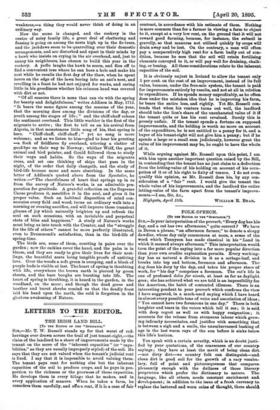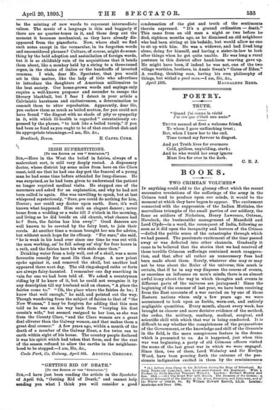FOLK-SPEECH.
[TO TEl EDITOR OP TEl " SPECTATOR."]
your interpretation of the proverb, "Every dog has his day, and a cat has two afternoons," quite correct ? We have in Devon a phrase, "an afternoon farmer," to denote a sleepy dawdler, whose day only commences at noon, a sense of the word which Tennyson has made classical in his "Land in which it seemed always afternoon?' This interpretation would, turn the point of the saying into a far more popular direction. than your own erudite explanation permits. Every working- day has as natural a division in it as a cottage-loaf, and breaks into top and bottom, forenoon and afternoon. The dog does his duty by the day, and takes his proper share of work, for " his day " comprises a forenoon. The cat's life is one of professed dolce far niente, at least as far as daylight. goes ; she has achieved what we are told is an impossibility for the American, the habit of contented idleness. There is an interesting pendant to your proverb which confirms the view I have suggested, in a much-used saying which I have heard in almost every possible tone of voice and association of ideas:. " You cannot have two forenoons in one day." There is both laughter and tears in the voices which tell it me; it is said. with deep regret as well as with happy resignation ; it. accounts for the release from strenuous labour which grow- ing infirmity necessitates, and justifies with something that is between a sigh and a smile, the unembarrassed basking of age in the last warm rays of the sun before it sinks below this life's horizon.
You speak with a certain severity, which is no doubt justi- fied by your quotations, of the coarseness of our country sayings ; they have at least the merit of being clean dirt. —not dirty dirt—we country folk can distinguish—and. clean dirt is good soil for the growth of a racy vocabu- lary, full of point and picturesqueness that compares. pleasantly enough with the dullness of those literary. proprieties which prefer the dictionary to nature. The language, like all others, needs constant enrichment and. development ; in addition to the issue of a fresh currency to. replace the battered and worn coins of thought, there should, be the minting of new words to represent intermediate values. The music of a language is thin and beggarly if there are no quarter-tones in it, and these drop out the moment it becomes mechanical, as they have already dis- appeared from the pianoforte. Now, where shall we find such notes except in the vernacular, in its forgotten words and unconsidered phrases ? Culture, of course, might do some- thing by the bold adoption and assimilation of foreign words, but it is so childishly vain of its acquisitions that it bends them about, like a monkey held by a string to a three-tuned organ, in the chains of italics or the handcuffs of inverted commas. I wish, dear Mr. Spectator, that you would act in this matter, like the lady of title who advertises to introduce the daughters of American millionaires to the best society. Our home-grown words and sayings only require a well-known proposer and seconder to escape the literary blackball, but I fear I detect in your article a Calvinistic harshness and exclusiveness, a determination to commit them to utter reprobation. Apparently, dear Sir, you eschew them as much as boiled mutton, for you could not have found " the disgust with no shade of pity or sympathy in it, with which ill-health is regarded " ostentatiously ex- pressed by the phrase, " to look like a boiled turnip," if you had been as fond as you ought to be of that excellent dish and its appropriate trimmings.—I am, Sir, &c.,



































 Previous page
Previous page